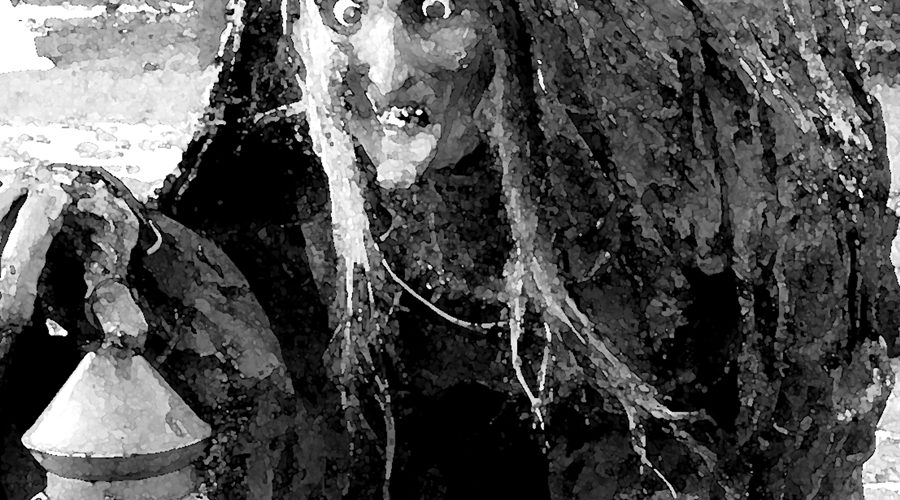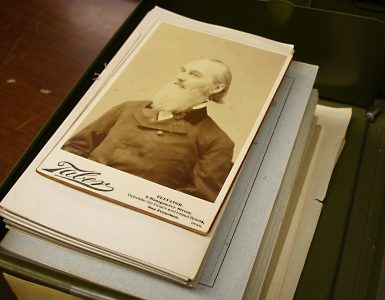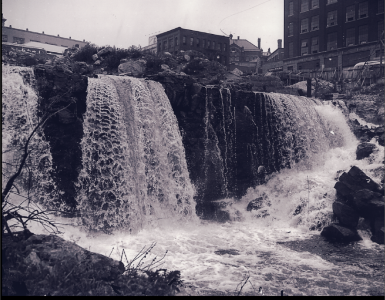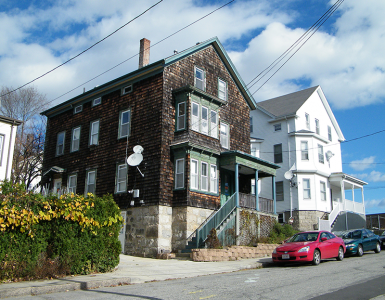by Mary Elizabeth Naugle
First published in October/November, 2005, Volume 2, Issue 5, The Hatchet: Journal of Lizzie Borden Studies.
A stream called the Quequechan flows through Fall River–peaceful enough when not storm swollen, with one exception, a cataract that angrily dashes the rocks with fists of foam. It is this spot that was shunned two hundred and fifty years ago, shunned less for its natural danger than for the evil rumors concerning a hut defiantly built on a rocky outcropping on its brink. A poor hut it was. Just a bundle of sticks that, had a great log been lashed to its middle would have done for a giantess’ broom. None dared go near it. Not a sound nor a flicker of movement was ever seen there by day. But late at night villagers heard ungodly noise burst forth from its walls and saw unearthly lights flash through its many unfilled crannies. Some had seen an old crone as well, strangely garbed, pacing before its threshold. Though the villagers muttered that the hut should be fired or tossed into the foam below, none truly dared do such a thing. They left both hut and hag to themselves.
This uneasy truce continued till the day when the townspeople were roused from their suppers by a great hue and cry. Once outside they found it plain to see whence the din had come, for great showers of sparks spewed forth from what served as a chimney to the crone’s hut. In a body, the villagers made for Peter Leonard’s store, the spot where all important decisions were made. The children wept, the women tried not to, the men blustered and longed for more courage.
Stephen Davis was quick with a suggestion as always, his tongue being much readier than his arm.
“Give me three good men, and I’ll rout her out and toss the hut over the cliff even if it holds Old Scratch himself and his progeny.”
Davis looked well pleased with these words–pleased enough to repeat them once or twice while strutting up and down the store, but making sure never to strut within a rod of the door.
At length, Peter Leonard suggested they do something besides talk.
“Let us take up the Bible and move in a body to the spot!” cried one.
“Let us first send for the minister from Assonet,” came Lot Lee.
“Let us stay where we are,” a third.
“Let us take up arms and burn the hut,” from Welcome Brown.
“A committee should visit the premises,” proposed Mark Woodward.
“Just as I said!” crowed Stephen Davis. “Give me five or six good men, and if there are less than a legion of infernal spirits, we’ll–”
The door of the shop flew open with such violence it flew off its hinges. And in stepped the stuff of nightmares: A smut streaked crone, her back folded over twice like a letter to be posted, her head hanging down from the first of these folds with a face like a guttered candle. Her brows, nose, and flesh all seemed of wax that was blown down. Her chin seemed long melted down, then lifted up by a sharp intake of breath, perhaps of shock at the effect of the rest of the face. And as if nature was not yet satisfied by this poor prank, it further bedecked its scarecrow with warts, some even sporting tufts of hair that teased and tickled at the wretch’s mouth–a mouth already caving in upon the vacancies left by long forgotten teeth. As if to make up for this ghastly appearance, the crone’s raiment, though dingy, still retained a former exotic resplendence. She was robed all in scarlet of generous and costly cut, a broad sash of the same fabric tied at the bent waist. Upon her feet were shoes of rawhide adorned with queer figures in red and tied round with black cord that sported red tassels.
“Who talks of throwing me or mine into the Quequechan? Who talks of priests and Bibles? Who of guns and fire?”
With a low creaking laugh she spied out Stephen Davis, only partially hidden by a cracker barrel.
“Thou braggart! Thou, Stephen Davis, talk of stirring up spirits! Thou, who dare not brave the cellar by daylight, talk of firing my hut? Out upon thee, scorn of thy race!” Her head swung like a lantern over the company. “All dumb? All dumb are ye, my masters? O, ye are a valiant band, truly.” Her stride spiralled outward toward the villagers clinging to its walls until she seemed ready to advance straight into Welcome Brown. More as a reflex than anything else, the man shot out his fist and struck the crone on the forehead. She was felled like a tree before them, trembled but briefly, then was still. Brown, in horror that he should have struck a woman, much less killed her, rushed to the crone’s side with useless attempts at revival.
“Merciful God, I have killed the woman!” He dared not meet the eyes of the company and fervently wished back the careless action. Just as he did so, he felt the gnarled fingers tighten round his. Brown, so grateful for reprieve, gave a great laugh for joy and tried to embrace his restored victim. But she was having none of it.
Springing up with a bound, she cried, “Laugh, fiend of hell, but know ye my revenge is sure and speedy!” With that she made an unerring swerve for Mrs. Brown and snatched up their year old baby. The crone shot through the door and flew swift as a comet for the cliff where her cabin still spat venomous sparks. The village swarmed after till they reached the topmost crag where stood the crone, holding out the baby over the deafening current.
“Not one foot nearer, ye devils incarnate! One step and the heir of Brown never draws breath again. Fire my hut, will ye? Aye, fire it! But know ye knaves, while ye destroy with fire, the Crone of the Quequechan destroys with water!”
With an effort the men held their clenched fists at their sides and held their breath, lest it should prompt the hag to carry out her threat. Then Mistress Brown stepped forward, silent and resolute, with empty arms pleading for her child. The light from the hut played over the young mother’s features, so the crone really saw them for the first time. And a great change swept over the hag, for a moment a woman once more.
“What be your Christian name, lass?” came a strangely softened voice. “Be it ‘Sarah,’ after your mother and granddam before ye?”
“Aye!” came the stunned reply.
“Aye, and ye have the look of an angel like her–I saw her picture once Did ye mother ever tell ye of her father?”
“No. He died before she could remember, while on business in–”
“In London, yes.” The crone looked down upon the babe in her arms with eyes grown tender. “The lad has his grandsire’s eyes. Nay, ye have no need to fear; I’ll not harm him.” The crone’s rough grasp was now a gentle cradle as she handed the child to his mother. Then she drew from her robe a letter, which she placed in the young mother’s hand.
The confused assembly parted for crone, who moved slowly, unassaulted to her hut. She passed in, then the whole hut burst into flames that none had set. It burned, they say, a week or more, then the wind swept the ashes clean to sift into the foam below.
The letter read as follows:
“ Boston, June 10, 1700
“Moll–
I am in the iron grasp of the king’s bloodhounds, and I fear I am done with this world. My wife and my daughter are assured their seats in heaven, but if you set a beacon fire, I’ll come to make thee my bride in hell.
KIDD”
And so died the crone of the Quequechan, mistress of Kidd the pirate. And so the old brigand kept his old promise at last.
Note: This story owes much to a story run first in 1845, then again in The Fall River Herald News in 1953. The crone’s death, and the connection between her and “Sarah” are pure invention.






